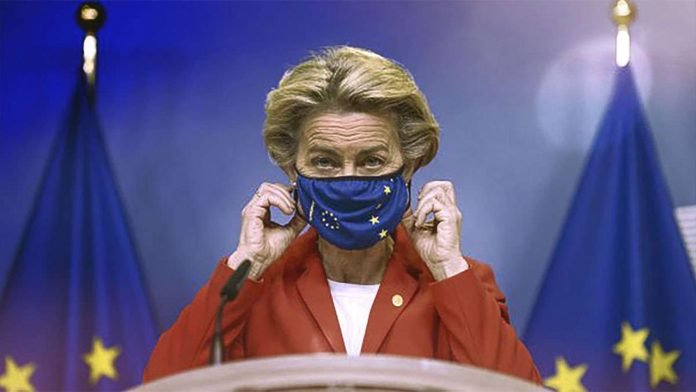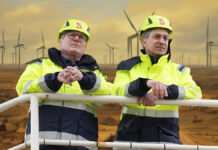The Amsterdam-based European Medicines Agency is due to announce its decision on approval of the Oxford-AstraZeneca coronavirus vaccine.
On Wednesday, the EU aired its frustrations with AstraZeneca, suggesting the pharmaceutical giant was reneging on its agreement.
European Commissioner for Health Stella Kyriakides said that the EU held “serious concerns regarding the intention of AstraZeneca to supply considerably fewer doses in the coming weeks than agreed and announced.”
“We have been making all efforts to resolve the situation,” she said at a briefing. “We convened a third meeting on Monday night, which resulted again in insufficient explanations from the company, and deep dissatisfaction among the Member States.”
‘Not acceptable’
“The view that the company is not obliged to deliver because we signed a ‘best effort’ agreement is neither correct nor is it acceptable.”
Kyriakides also said that under the contract it signed with AstraZeneca for the delivery of COVID-19 vaccines, the drugmaker committed to providing doses from four plants, including two in Britain.
Today the EU published its coronavirus vaccine contract with AstraZeneca amid an ongoing row over delays to vaccine deliveries.
It came after European Commission President Ursula von der Leyen weighed in on the dispute with the pharmaceutical company, claiming on a German radio station on Friday that there is “no plausible explanation” for its delay in supplying its vaccine to the EU.
The European Commission has been locked in a dispute with the British-Swedish pharmaceutical company since it said it would deliver far smaller than expected supplies to EU member nations.
However, at this moment in time, The European Medicines Agency has still not authorised the use of the vaccine AstraZenecais. It is expected its use will be authorised today.
The vaccine AstraZeneca developed with Oxford University. It would be the third cleared for use in the EU, after the BioNTech-Pfizer and Moderna vaccines.
Last spring, Germany and France blocked exports of masks outside their own borders. Fearing a collapse of the single market, the Commission publicly called for the removal of such restrictions, but Berlin only agreed to remove its ban after the Commission imposed restrictions on exports outside of the EU.
Under that EU-wide export authorization scheme, EU producers of masks, protective spectacles and garments had to ask their national governments for an export authorization before selling such products outside of the bloc.
Once again, Germany is one of the driving forces for strong action. “A legal obligation for authorization of vaccine exports at EU level makes sense,” Spahn said on Twitter Monday, reiterating this point in several TV interviews.
Trumpian protectionism
Now amid a very public fight with the pharmaceutical giant AstraZeneca over a vaccine production shortfall, the Commission said it will seek to impose a mechanism on Friday by which EU countries will be able to block vaccine exports if the EU’s own purchase orders have not yet been filled.
AstraZeneca, BioNTech and Pfizer have EU production sites. Moderna completes its vaccines for countries other than the US in Spain, although the vaccine itself is produced in Switzerland, which is not an EU member.
It is a drastic step, raising a spectre of Trumpian protectionism that goes against the EU’s core self-image as a proselytizer of free trade, proponent of multilateralism and professed champion of global equity, particularly in the distribution of vaccines, which has been a personal priority of Commission President Ursula von der Leyen since the outset of the pandemic.
Several officials said that the EU’s new measures were targeted mainly at AstraZeneca, which a week ago abruptly announced that it would deliver roughly one-quarter of the vaccines that the EU planned to receive in the first three months of this year, leaving the bloc at least 75 million doses short of expectations.
There was also particular ire over the fact that the U.K. had received shipments of the AstraZeneca vaccine made at plants in Continental Europe, but the company so far has refused to divert any supplies from two factories in Britain to make up for shortages at a facility in Belgium. The EU insists its contracts provided for the bloc to receive doses made at the U.K. plants as well as in the EU.
While the EU has focused on AstraZeneca, World Trade Organisation rules require the EU to implement any emergency restrictions universally and the broad scope of the new mechanism quickly fueled fears in capitals outside the EU that Brussels might not only restrict international shipments of the AstraZeneca vaccine but also of the BioNTech/Pfizer jab. Ultimately, the restrictions are to be imposed by the individual EU countries where factories are located, with EU guidance.
In a reply to a letter he received from four European government leaders, EU Council President Charles Michel said the EU “should explore all options and make use of all legal means and enforcement measures at our disposal,” if negotiations with drug companies don’t yield satisfaction.
AstraZeneca said last week that it planned to cut initial deliveries in the EU from the scheduled 80 million doses for the first quarter of the year to 31 million doses. The company cited reduced yields from its manufacturing plants in Europe, but the EU suspects doses produced in Europe have been directed elsewhere.
Michel said use of the EU treaties would allow the EU and member states to take “appropriate urgent measures, to ensure effective vaccine production and supply for our population”.
The European Commission also plans to new rules strengthening the control of vaccine exports to ensure the doses it bought are delivered to the bloc’s residents.
The dispute highlights the tension over vaccine supplies as Europe struggles to roll out inoculation programmes against the coronavirus.
Countries like Serbia who have bought into the EU vaccine scheme condemned the EU on its failures bringing in vaccines from elsewhere to protect their citizens who are now having Chinese and Russian vaccine rollout.
Meanwhile, the UK vaccines taskforce has bought 60m doses of the Novavax vaccine, it has been found to be 89.3% effective and 85.6% effective against the UK strain, however, the US firm reported it may only be 50% effective against the South African variant.
The Novavax worked against the disease variant first identified in Kent, which has proved to be up to 70% more infectious, the Department of Health said.
The jab still needs approval from the UK regulator before it can be distributed in Britain.
But if the injection is approved by the vaccines watchdog – the Medicines and Healthcare Products Regulatory Agency – 60 million doses will be delivered to the UK in the second half of this year.
It will be manufactured on Teesside in the UK.
Support Independent Journalism Today
Our unwavering dedication is to provide you with unbiased news, diverse perspectives, and insightful opinions. We're on a mission to ensure that those in positions of power are held accountable for their actions, but we can't do it alone. Labour Heartlands is primarily funded by me, Paul Knaggs, and by the generous contributions of readers like you. Your donations keep us going and help us uphold the principles of independent journalism. Join us in our quest for truth, transparency, and accountability – donate today and be a part of our mission!
Like everyone else, we're facing challenges, and we need your help to stay online and continue providing crucial journalism. Every contribution, no matter how small, goes a long way in helping us thrive. By becoming one of our donors, you become a vital part of our mission to uncover the truth and uphold the values of democracy.
While we maintain our independence from political affiliations, we stand united against corruption, injustice, and the erosion of free speech, truth, and democracy. We believe in the power of accurate information in a democracy, and we consider facts non-negotiable.
Your support, no matter the amount, can make a significant impact. Together, we can make a difference and continue our journey toward a more informed and just society.
Thank you for supporting Labour Heartlands












